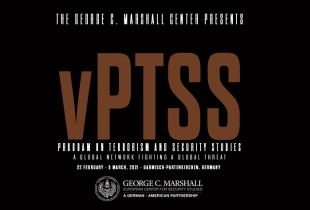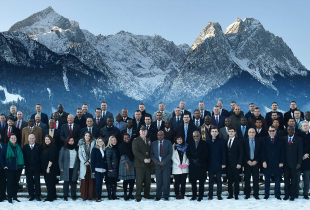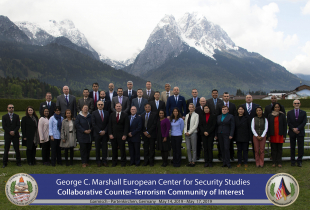
Marshall Center International Law Expert Explains Legal Role in Combating Terrorism
By Christine June
Public Affairs Office
George C. Marshall European Center for Security Studies
GARMISCH-PARTENKIRCHEN, Germany (July 27, 2015) – Dean L. Dwigans, the George C. Marshall European Center for Security Studies’ deputy director and chief of operations for Non-Resident Programs, explains Counterterrorism and the Law to 75 participants from 51 countries attending the Program in Terrorism and Security Studies July 27 at the Marshall Center here.
In his presentation, Dwigans described the difference between the armed conflict and law enforcement legal approaches to combating terrorism.
He also identified the main international legal controversies and some of the tools, methods and international law that facilitate international law enforcement cooperation in combating terrorism.
As the Deputy Director and Chief of Operations for Non-Resident Programs, Dwigans oversees the three Outreach Teams for the regions of Central Asia, Central and Southeast Europe, and Black Sea Eurasia, as well as the Alumni Team.
The Outreach teams conduct approximately 35 events annually in their regions and in Garmisch, and the Alumni team conducts more than 40 events for the more than 10,500 alumni who have attended one of the Marshall Center’s resident programs.
The Alumni team is also responsible for GlobalNET, the digital portal serving all alumni and current resident course participants.
From 2010 to 2015, Dwigans was the director of alumni programs for the Marshall Center, and from 2007 to 2010, he was the Judge Advocate General of the Navy Chair in International Law, professor of international law and director of the Program in Advanced Security Studies at the Marshall Center.
Dwigans retired as a captain from the U.S. Navy in 2010 after a 25-year career as an officer in the Judge Advocate General’s Corps.
PTSS 15-7 participants hail from: Afghanistan; Albania; Armenia; Bangladesh; Belize; Bosnia and Herzegovina; Botswana; Cameroon; Costa Rica; Croatia; Czech Republic; Dominican Republic; Egypt; Estonia; Georgia; Germany; Greece; Hungary; Ireland; Italy; Kenya; Kosovo; Kyrgyzstan; Latvia; Macedonia; Malaysia; Mali; Malta; Mauritania; Mauritius; Moldova; Morocco; Nigeria; Pakistan; Peru; Philippines; Poland; Romania; Rwanda; Senegal; Serbia; Sierra Leone; South Africa; South Korea; Tanzania; Thailand; Togo; Tunisia; Uganda; United States; and, Uzbekistan.
The PTSS course addresses numerous aspects of a threat that confronts nations around the globe.
The four-week course is designed for government officials, military officers and police administrators currently working in mid- and upper- level management positions of counterterrorism organizations throughout the world.
The mission of the Marshall Center, as a vital instrument of German-American cooperation, is to create a more stable security environment by advancing democratic institutions and relationships; promoting active, peaceful, whole-of-government approaches to address transnational and regional security challenges; and, creating and enhancing enduring partnerships worldwide.


